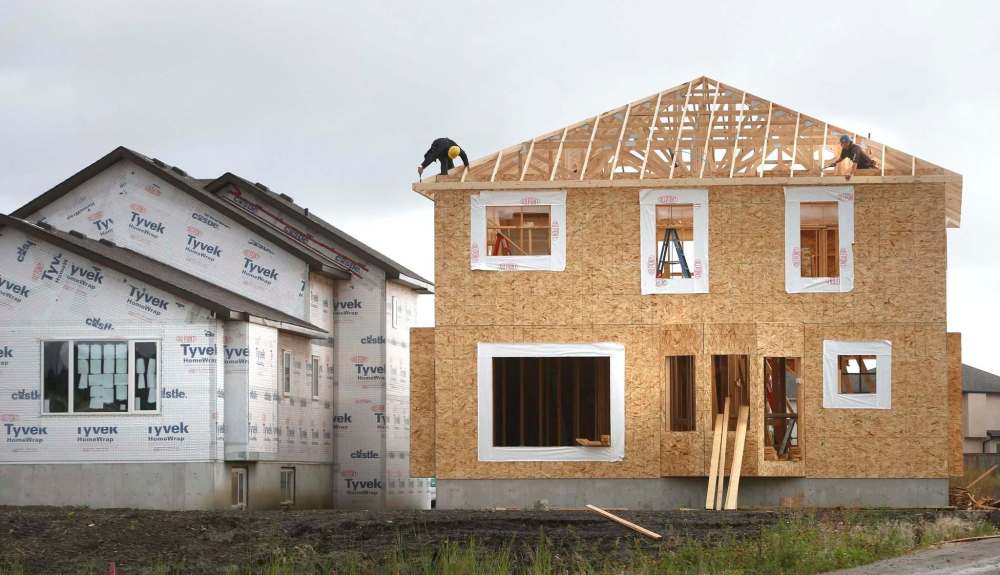CMHC sees balanced market for house prices but some overbuilding
Advertisement
Read this article for free:
or
Already have an account? Log in here »
To continue reading, please subscribe:
Monthly Digital Subscription
$0 for the first 4 weeks*
- Enjoy unlimited reading on winnipegfreepress.com
- Read the E-Edition, our digital replica newspaper
- Access News Break, our award-winning app
- Play interactive puzzles
*No charge for 4 weeks then price increases to the regular rate of $19.00 plus GST every four weeks. Offer available to new and qualified returning subscribers only. Cancel any time.
Monthly Digital Subscription
$4.75/week*
- Enjoy unlimited reading on winnipegfreepress.com
- Read the E-Edition, our digital replica newspaper
- Access News Break, our award-winning app
- Play interactive puzzles
*Billed as $19 plus GST every four weeks. Cancel any time.
To continue reading, please subscribe:
Add Free Press access to your Brandon Sun subscription for only an additional
$1 for the first 4 weeks*
*Your next subscription payment will increase by $1.00 and you will be charged $16.99 plus GST for four weeks. After four weeks, your payment will increase to $23.99 plus GST every four weeks.
Read unlimited articles for free today:
or
Already have an account? Log in here »
Hey there, time traveller!
This article was published 20/02/2020 (2101 days ago), so information in it may no longer be current.
OTTAWA — Winnipeg’s housing prices have fallen in line with incomes this quarter, though there might be too many houses being built in the city, according to federal data released Thursday.
The Canada Mortgage and Housing Corporation has downgraded Winnipeg’s risk of overvaluation from moderate to low, though it still has a concern about overbuilding.
“Overall, we’re seeing balanced market conditions for Winnipeg, compared to some of the other Prairie provinces,” CMHC Winnipeg analyst Heather Bowyer told the Free Press. “We’re seeing a bit of buyers’ market conditions.”

The Crown corporation releases quarterly housing-market assessments for the Winnipeg area, which includes East and West St. Pauls, as well as municipalities with a large share of commuters.
The assessment for February 2020 found house prices that had been higher than disposable incomes last year have trended back to affordable levels.
That’s thanks to low mortgage rates, as well as an uptick in both the population aged 25 to 34 years, as well as jobs that are both full- and part-time, meaning more buyers have more money to work with.
“This caused our overvaluation gap to narrow, and removed the signal of imbalances for this quarter,” said Bowyer.
The CMHC remains concerned about overbuilding in Winnipeg, though the numbers declined from a year prior, and from a peak in 2016.
Having too many homes on the market can impact housing values, while also disincentivizing developers, which can lead to deeper mismatches between demand and supply down the road.
“We are seeing some moderate degree of overbuilding in Winnipeg, so it’s just something to watch, with the level of new construction happening,” said Bowyer, noting homes are staying on the market, while condos face more demand.
Currently, single-detached homes make up almost half the completed houses on the Winnipeg market in late 2019.
Overbuilding could also stem from a healthy rental-vacancy rate in the city, and competition from resold homes steering buyers away from taking new homes.
An oversupply of houses is a concern across the Prairies: the CMHC has deemed it a high risk for Regina, while the housing market in Alberta appears to still be adapting as that province’s economy recovers.
The CMHC is undergoing analysis on economic trends on the housing market nationwide; the Crown corporation should know in about a month the impact of mortgage changes and a global health emergency on housing.
“We’re figuring out the impacts of things like coronavirus (COVID-19) on the economy and housing markets,” said CMHC chief economist Bob Dugan. “We’re in the middle of our analysis right now.”
dylan.robertson@freepress.mb.ca

